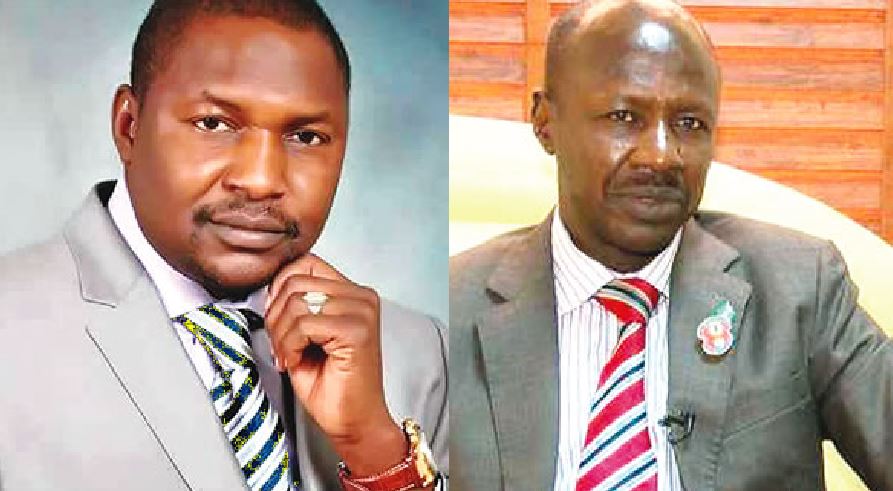Indications have emerged on how appointees of President Muhammadu Buhari often referred to as ‘
According to TheNewsguru.com findings, those involved in the ‘Maina-reinstatement-saga’ include, the chairman Federal Civil Service Commission, Minister of Interior, Abdulrahman Dambazau and Minister of Justice, Abubakar Malami.
In two separate letters obtained by TheNewsGuru- letters by the Federal Civil Service Commission [FCSC] addressed to Maina and the Head of Service, Mrs. Winifred Oyo-Ita, Maina was reinstated into the service with effect from February 21, 2013, being the date he was earlier dismissed from service.

The letters also show that the FCSC approved Maina to sit for the next promotion examination for the post of Director (Administration), Grade Level 17.
Both letters dated September 18, 2017 were with reference number FC.4029.82/VOL.III/179.
The two letters were signed by Mustapha L. Sulaiman on behalf of the Chairman of the FCSC.
The letter addressed to Maina indicated that Malami, in his letter with reference number HAGF/FCSC/2017/VOL.1/3 and dated April 27, 2017 “requested” the FCSC to reinstate Maina on the basis that the warrant issued for Maina’s arrest had been quashed by a court order.
The letter with the title, ‘Reinstatement into service: Alhaji Abdulrasheed Abdullahi Maina, Deputy Director (Administration), SGL 16; stated, “Kindly refer to the Attorney General of the Federation/Honourable Minister of Justice letter Ref. No. HAGF/FCSC/2017/VOL.1/3 dated April 27, 2017 requesting the Federal Civil Service Commission to give consequential effect to the judgment that voided the warrant of arrest issued against A. A. Maina which formed the basis for the query and his eventual dismissal.

“Further to the aforementioned letter, the Federal Civil Service Commission at its meeting held on June 14, 2017 deliberated on the Attorney General of the Federation’s letter and requested the Office of the Head of the Civil Service of the Federation vide letter FC.4029/82/VOL.III/160 of June 21, 2017 to advise the Permanent Secretary, Ministry of Interior to consider the AGF’s letter, the officer’s case and make appropriate recommendation to the commission.
“The OHCSF accordingly advised the Ministry of Interior to consider the matter.
“The Ministry of Interior at its Senior Staff Committee meeting held on June 22, 2017 considered the disciplinary case against the officer and the letter by the Attorney General of the Federation and Minister of Justice seeking the reinstatement of the officer as a Director (Administration), SGL. 17 in the Federal Civil Service.”
The letter added that the Senior Staff Committee of the Ministry of Interior recommended Maina’s reinstatement and the approval for him to sit for promotion examination.
It read in part, “The Ministry of Interior’s Senior Staff Committee deliberated on the case and recommended that Mr. Maina be reinstated into the Service as Deputy Director, SGL. 16. The Office of the Head of the Civil Service of the Federation vide letter Ref. No. HCSF/LU/COR/FCSC/749/III/135 dated August 14, 2017 forwarded the recommendations of the Senior Staff Committee of the Ministry on Interior to the FCSC for further necessary action.
“The FCSC at its meeting held on Wednesday, August 16, 2017 considered the letter from the Attorney General of the Federation and Minister of Justice and the recommendations of the Senior Staff Committee of the Ministry of Interior on the disciplinary case against Alhaji Abdulrasheed Abdullahi Maina, Deputy Director (Administration), Salary Grade Level 16. The FCSC, thereafter, approved the reinstatement of the officer into the service with effect from February 21, 2013 (being the date he was earlier dismissed from service). The FCSC, also approved for the officer to sit for the next promotion examination to the post of Director (Administration), SGL. 17.
“I am therefore to convey the approval of the FCSC for the reinstatement into the Service of Alhaji Abdulrasheed Abdullahi Maina, Deputy Director (Administration), SGL 16.”
The FCSC reproduced the content of letter addressed to Maina in the copy sent to the Head of Service.
But the FCSC, in its letter addressed to the Head of Service, stated, “You are kindly requested to deliver the attached original letter to the officer, please.”
TheNewsGuru.com reports that President Muhammadu Buhari had earlier in the day dismissed Maina from the civil service and also queried the HoS over his initial reinstatement.

